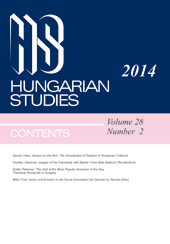“A Hungarian for Hungarians, and Nothing for Mankind?” William Lloyd Garrison's Response to Kossuth's Stance on Slavery
“A Hungarian for Hungarians, and Nothing for Mankind?” William Lloyd Garrison's Response to Kossuth's Stance on Slavery
Author(s): András TarnócSubject(s): 19th Century
Published by: Akadémiai Kiadó
Keywords: antebellum slave narrative; indirect slave narrative; abolition; Monroe Doctrine; fallacy
Summary/Abstract: Following the crushing of the Hungarian Revolution and War of Independence of 1848–1849 Lajos Kossuth was forced into exile in Turkey. Thanks to intervention on behalf of the American government that he was able to travel to the United States in 1851–52. His visit left a lasting mark on American culture. He made over 500 speeches and public appearances, however his position on slavery led to a controversy eventually undermining his original purpose of securing American support for the potential renewal of the Hungarians’ struggle for freedom. While anti-slavery activists in the United States, especially William Lloyd Garrison, were looking forward to him openly supporting the abolitionist cause, Kossuth opted for a much-maligned policy of non-interference. In response, Garrison, while admiring Kossuth at first, changed his stance and launched a vitriolic attack in a book-sized publication titled Letter to Louis Kossuth Concerning Freedom and Slavery in the United States (1852). While the circumstances of Kossuth's visit have been a subject of numerous scholarly essays, I intend to focus on Garrison's text in the forthcoming analysis of its form and content.
- Issue Year: 33/2019
- Issue No: 1
- Page Range: 61-72
- Page Count: 12
- Language: English

